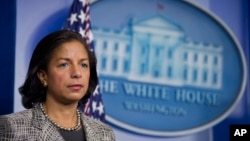Susan Rice, President Obama’s national security adviser, said Friday that the United States and the international community were united in responding to the crisis in Burkina Faso.
“The junta should step aside and allow preparations for the October elections to resume immediately. The U.S. stands squarely with the people of Burkina Faso in rejecting this threat to their democratic progress,” she said in her keynote address to the Congressional Black Caucus Foundation’s Legislative Conference in Washington.
Rice said the United States was reviewing its assistance to Burkina Faso.
Earlier, U.S. Assistant Secretary of State Linda Thomas-Greenfield told VOA there’s no excuse for what happened. “Having a coup is not the way to show their displeasure, and they also need to make sure they do not use their power to attack civilians," Thomas-Greenfield cautioned.
In an ever-changing political landscape in Africa, Rice said more work to end old mindsets and address entrenched challenges needs to be done, even after four presidential trips to the region, a historic summit in Washington and signature development initiatives.
Investment in Africa
She also said Africa’s rise was important not just to Africa but to the entire world.
“None of the global challenges of curbing climate change, promoting inclusive economic growth and ending violent extremism can be met without the voices and contributions of 1 billion Africans,” she said.
Rice took a moment to praise the work of the Congressional Black Caucus.
The work of the CBC “has built a bipartisan consensus that gets things done for Africa," she said. "From fighting apartheid to supporting PEPFAR [an AIDS relief plan], from confronting the genocide in Darfur to easing the suffering of the people in South Sudan to tackling the Ebola crisis in West Africa.”
U.S. Representative Karen Bass, a California Democrat who sponsored the event, said it was important to move forward on trade, health and governance a year after the landmark U.S-Africa summit.
“We started off the day by talking about the Ebola crisis," she said. "It is over, but the fact is that the crisis revealed the need to really develop the health infrastructure in Africa. And then ... we have a panel that is talking about trade. Now that AGOA has passed, let us really fast-forward the implementation."
Export measure
AGOA, the African Growth and Opportunity Act, allows eligible nations to export goods tax-free into the United States.
Bass said that understandably, many eligible countries have not achieved the level of development to address the U.S. market. She said, for example, that “if you have a store that can make 50 or 100 purses, for our market you need to make 50,000." The challenge, she said, is to get smaller African nations to collaborate so they can scale up their enterprises.
Bass also said it’s important to focus on some of the successes, like the recent elections in Nigeria and Namibia.




